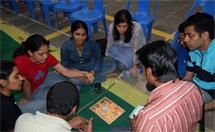Chinmaya Balavihar Program
![]()
From birth to 12th Grade, we offer classes & activities based on the universal philosophy of Advaita Vedanta to achieve cultural sensitivity & awareness.
Read More
Serving the community
![]()
From mentoring for English learners to neighborhood cleanup, we take up a leadership role in assisting those in need, in the community that we live in.
Read More
Chinmaya Youth Program

Our youth program aka Chinmaya Yuva Kendra (CHYK) dedicated to unleashing the potential of young individuals through vibrant spirituality & service.
Read More
Adult Study Groups
![]()
The study group syllabus was designed by Gurudev so that anyone could follow the curriculum systematically & advance their understanding.
Read More
Chinmaya Swaranjali Group
![]()
Chinmaya Swaranjali (Choir) is the musical wing of Chinmaya Mission, we have a very active group, coming from all age groups and musical abilities.
Read More
Chinmaya Hindi Program
![]()
The Chinmaya Mission Hindi classes are the best sought out classes for the Hindi language in Greater Portland area, offering to all levels of students!
Read More
The Gita is not meant for the decaying or dying. It is meant for you who are on the threshold of life, bubbling with enthusiasm to plunge into the field of action, to struggle, to sweat, to strive, to succeed.
– Swami Chinmayananda
Frequently Asked Questions about Adult Study Groups
1. Who can join a study group?
2. What type of commitment do I have to make?
3. Do I have to know Sanskrit?
4. Is there a fee to join the study group?
5. How can I join a study group?
6. I have never studied Vedanta. Can I attend the study classes?
7. Can our youngsters join the study group?
Typically they should be older than 18 years to benefit from this program. For the younger age-group, we have Bala Vihar programs specifically geared towards their age-group; we recommend that you take advantage of these programs.
8. Can I join when the study group is already started studying several verses of the text?
Why Study Scriptures?
Swami Tejomayananda
There are a number of realized Masters who have not studied the scriptures. Many scholars got answers to scholastic questions regarding the scriptures from Sri Ramana Maharishi, who himself had not studied the scriptures. Pundits have written learned commentaries on simple compositions of great saints like Surdasaji and Kabirdasji, who themselves had no formal education. Then why should we read the scriptures?
Highly evolved souls like Ramana Maharishi could have studied the scriptures in a previous birth, the essence of which was carried by them in the next life and which led them to the Truth
purvabhyasena tenaiva
hriyate hy avaso ‘pi sah |
jijnasur api yogasya
sabda-brahmativartate ||
Indeed, they feel drawn toward God, even against their will, on the strength of their past discipline. Such seekers naturally rise above the ritualistic principles of the scriptures. (Bhagavad Gita 6:44)
However, mere scholarly study, intellectual discussions, writing commentaries, or collecting information about the scriptures cannot lead us to the realization of the Truth. Nor can an extrovert mind understand the subtle essence of the scriptures.
avijñāte pare tattve śāstrādhītistu niṣphalā |
vijñāte’pi pare tattve śāstrādhītistu niṣphalā ||
The purpose of scriptural studies is to realize the truth. If that is attained, the study is fruitful, if not, it is in vain. (Vivekachudamani 59)
Sri Adi Sankaracarya urges us to study the scriptures daily –
vedo nityam adhiyatam – (Sadhana Panchakam 1)
In the Taittiriya Upanisad in his convocation address to the students, the Guru advises them never to be inadvertent in the study and the propagation of the scriptures
svadhyaya pravaca-nabh-yam na pramaditavyam (Taittiriya Upanishad 11:1)
Thus, the scriptures are the means to self-Knowledge. However, once the goal is reached, the means having served their purpose are not required. Then, we are directed to leave the scriptures as one would discard the husk of grains.
grantham abhyasya medhāvī jñāna-vijñāna-tatparaḥ
palālam iva dhānyārthī tyajed grantham aśeṣataḥ ( Amritabindu Upanishad 18).
But till the shore is reached where is the question of abandoning the boat?
However, the realized Master is always grateful to the Guru who taught him the scriptures. He knows that his infinite gain would have been impossible without the Guru and the scriptures, and therefore he shows great reverence towards them. He truly appreciates the importance of the scriptures and therefore he teaches the divine knowledge enshrined in them to all those who seek it. He may even listen to discourses by other great men on the scriptures or himself read them just to revel in the Truth.
If you have any specific questions related to our study groups and Satsang, please contact our Study Group coordinator.
List of our Adult Study Groups
Adult Study Groups Curriculum & Books